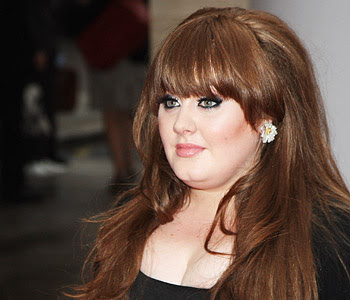I guess it’s safe to say that Adele’s had a pretty good year. A standing ovation and an armful of awards at last week’s Grammys. Global sales of 17 million. The most successful UK record of the 21st century. Even the recent drama of her hemorrhaged vocal chords had a happy ending, as she proved that her voice has lost none of its power, for anyone who worried (perhaps unnecessarily) that she might be left squeaking out of a hole in her neck.
As she prepares to settle into a fancy mansion set in 25 acres of West Sussex countryside, she can probably afford to lock away that tear-stained diary once and for all, and watch the royalty cheques start piling up.
She’s even on the front cover of Vogue this month, albeit airbrushed so heavily that she looks like she’s half woman, half pebble. Let’s be honest, Vogue isn’t known for showcasing women who look like they’ve ever kept a lunch down, never mind asked for seconds. But this is Adele, the saviour of modern British music, so I guess the ordinary rules don’t apply.
It’s one thing to shift a bucketload of records, but it’s another thing entirely to enter the zeitgeist with your sophomore release. Recently, Saturday Night Live ran a sketch featuring comedy’s answer to Adele, Kristen Wiig, and guest star Emma Stone, as part of a posse of office women who like to cry and sing along with ‘Someone Like You’. Only twelve months old, and it can already take its place alongside ‘All By Myself’ as the go-to karaoke choice for Chardonnay-soaked singletons everywhere.
What’s interesting to me about the whole Adele phenomenon, isn’t the success she’s so rightly earned, but the credibility she’s garnered along with the sales figures. After all, it could have all been so different.
As a former attendee of the Brits school, Adele can count the likes of Dane Bowers, Leona Lewis and Jessie J amongst her fellow alumni. But whereas their names will forever be associated with disposable pop, Adele gets the credit as a true artist.
So what’s the difference? Look at Leona, for instance. Another spectacular voice from decidedly humble beginnings, Leona took the talent show route, correctly speculating that this was the best way of gaining some traction within the music industry. But in spite of how much acclaim her voice may muster, or however much Leona might contribute to writing her own material, her reputation will always be tarnished by the association with Simon Cowell’s pop factory.
Maybe Adele was right to avoid the Syco route – X-Factor and the like have never known what to do with a plus-size singer. The last time they tried, Michelle McManus romped to victory swathed in a hot pink muumuu, belting out disco cover versions like a regional drag act. Her subsequent album limped into obscurity, and within a year she was reduced to hitching up her skirt and shitting into a Tupperware for Gillian McKeith to poke with a stick.
Instead, Adele went the MySpace route (remember when that was still a thing?) and soon got signed to an independent record label. Her debut album, 19, was a critical and commercial smash, but nothing compared to last year’s world-beating follow-up, which spawned three enormous singles and broke sales records everywhere.
Although critics were quick to heap acclaim on Adele’s artistry and soul, it’s worth noting that 21 is just as much a ‘product’ as the output of her poppier contemporaries. The list of co-writers and producers on the album’s credits reads like a who’s-who of commercial pop, including such ubiquitous names as Ryan Tedder, Eg White and Fraser T Smith. Between them, they’ve notched up countless hits for Britney Spears, Ke$ha, Beyonce, Kylie, Will Young, James Morrison, Kelly Clarkson and Leona.
And yet somehow, these other works are lazily dismissed as derivative commercial fodder. It’s not as if Adele’s own sound is particularly innovative, since it’s clearly been cast in the sixties-throwback mold of Amy Winehouse, another Brits School graduate.
21 is full of impeccably performed, well-written pop music. But in many ways, it’s no better or worse than the output of many of her chart rivals. Perhaps there’s something in Adele’s raw vocal performances, and commitment to blue-eyed-soul that makes her seem somehow more authentic - it’s safe to say that, unlike many others, she’s never been a slave to Autotune.
But let’s not kid ourselves. Even great pop music is still pop music, and I say that as a true devotee. I’d just like to see a more even playing field, and a little more critical objectivity, when it comes to appraising the genre. Anything else is just pulling the wool-polyester blend over our eyes.


No comments:
Post a Comment